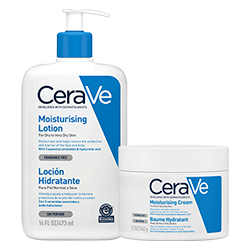Common eczema triggers
Every case of eczema is different, but dermatologists have identified several eczema triggers, that, when combined with a genetic predisposition,5 can lead to an eczema outbreak. However, it’s important to keep in mind that there can be a delay between exposure to eczema triggers and an eczema flare up.5 This can make it even more difficult to identify what triggers eczema. Among the most common eczema triggers are:
Dry skin: Keeping skin hydrated should be a top priority when struggling with eczema. When skin becomes rough, tight and dehydrated, it’s more likely to experience an eczema flare up.5
Irritants: Harsh chemicals like cleaning supplies, everyday products like soap, detergent, dyes, shampoo and skincare products—as well as wearing polyester or wool and touching fruits, vegetables and meats can be eczema triggers.5.9
Weather: A drastic change in environmental conditions, as well as climate extremes, can trigger an eczema flare up. Excessive heat and sweating during summer and dry skin caused by winter weather often leads to an eczema outbreak.5.10
Allergens: There are a variety of allergens that are eczema triggers, including pollen, dust mites, mold and pet dander.5.11
Stress: Emotional stress is among the many eczema triggers, perhaps because of the increased production a certain stress hormone associated with the body’s natural “fight or flight” response.5,6
Infections: An eczema flare up can occur when the body is fighting bacteria, fungus and viruses such as staph, molluscum or herpes. This extra stress on the immune system can cause eczema symptoms to worsen, which is another reason it’s important for a doctor or dermatologist to treat these microbial infections.5,12
Hormones: Women are especially prone to an eczema outbreak in tandem with hormonal fluctuations.13
How to manage an eczema flare up
Now that you know what causes eczema to flare up, the next step is understanding how to keep skin calm and comfortable. Beyond avoiding eczema triggers, keeping skin moisturized with creams is key. Ingredients like ceramides that can help restore the skin’s barrier can be beneficial as well. Avoiding long baths and showers (and hot water) can also help prevent an eczema flare up7. Be mindful of the clothing you wear as well—and opt for soft, natural fabrics such as cotton and silk to help minimize the chances of an eczema outbreak.1 If these efforts don’t help improve eczema symptoms, it’s best to see a dermatologist.
Everyday eczema relief
A good first step for getting eczema relief is the proper skincare regimen. Eczema can be aggravated by harsh personal-care products, which is why it’s important to choose a gentle wash that cleanses, soothes and hydrates the skin. Additional beneficial skincare ingredients include ceramides to help restore the skin barrier, which helps keep moisture in the skin while keeping irritants out, as well as hyaluronic acid for extra moisture. Applying a moisturizer with these ingredients and soothing niacinamide after cleansing helps calm the skin as well—and remember to apply often throughout the day.
- Sidbury R, Tom WL,et al. “Part 4: Guidelines of care for the management of atopic dermatitis. Part 4: Prevention of disease flares and use of adjunctive therapies and approaches.”J Am Acad Dermatol. 2014 Jul;71(1);1218-33.
- Thomsen SF. Atopic dermatitis: natural history, diagnosis, and treatment.ISRN Allergy. 2014;354250:1-7.
- Eichenfield LF, Tom WL, Chamlin SL, et al. Guidelines of care for the management of atopic dermatitis. Section 2. Management and treatment of atopic dermatitis with topical therapies.J Am Acad Dermatol. 2014;71(1):116-132.
- https://www.telegram.com/ZZ/sponsored/20190109/eczema-triggers-to-avoid-in-2019
- https://nationaleczema.org/eczema/causes-and-triggers-of-eczema/
- Akdis CA, Akdis M, Bieber T, et al. Diagnosis and treatment of atopic dermatitis in children: European Academy of Allergology and Clinical Immunology/American Academy of Allergy, Asthma and Immunology/PRACTALL Consensus Report.J Allerg Clin Immunol. 2006;118:152-169.
Oszukowska M, Michalak I, Gutfreund K, et al. Role of primary and secondary prevention in atopic dermatitis.Postep Derm Alergol. 2015;32(6):409-420. - https://nationaleczema.org/eczema/treatment/bathing/
- Proksch, Ehrhardt et al. Journal of Dermatological Science, Volume 43, Issue 3, 159-169
- https://nationaleczema.org/eczema/types-of-eczema/contact-dermatitis/
- Vocks, E., Busch, R., Fröhlich, C. et al. Int J Biometeorol (2001) 45: 27.
- Ruzicka, B. Przybilla, J. Ring (2006) Handbook of Atopic Eczema; 2ndedition; Springer
- http://weishendopublications.com/uploads/3/4/4/9/34499679/eczema.pdf
- https://www.nature.com/articles/pcrj200706
Remarks: This general information is not intended to diagnose any medical condition or to replace your healthcare professional. In cause of any doubt about your skin condition or cosmetic and/or skincare products, consult medical doctors and/or dermatologist advice prior use.




